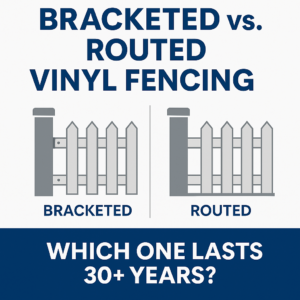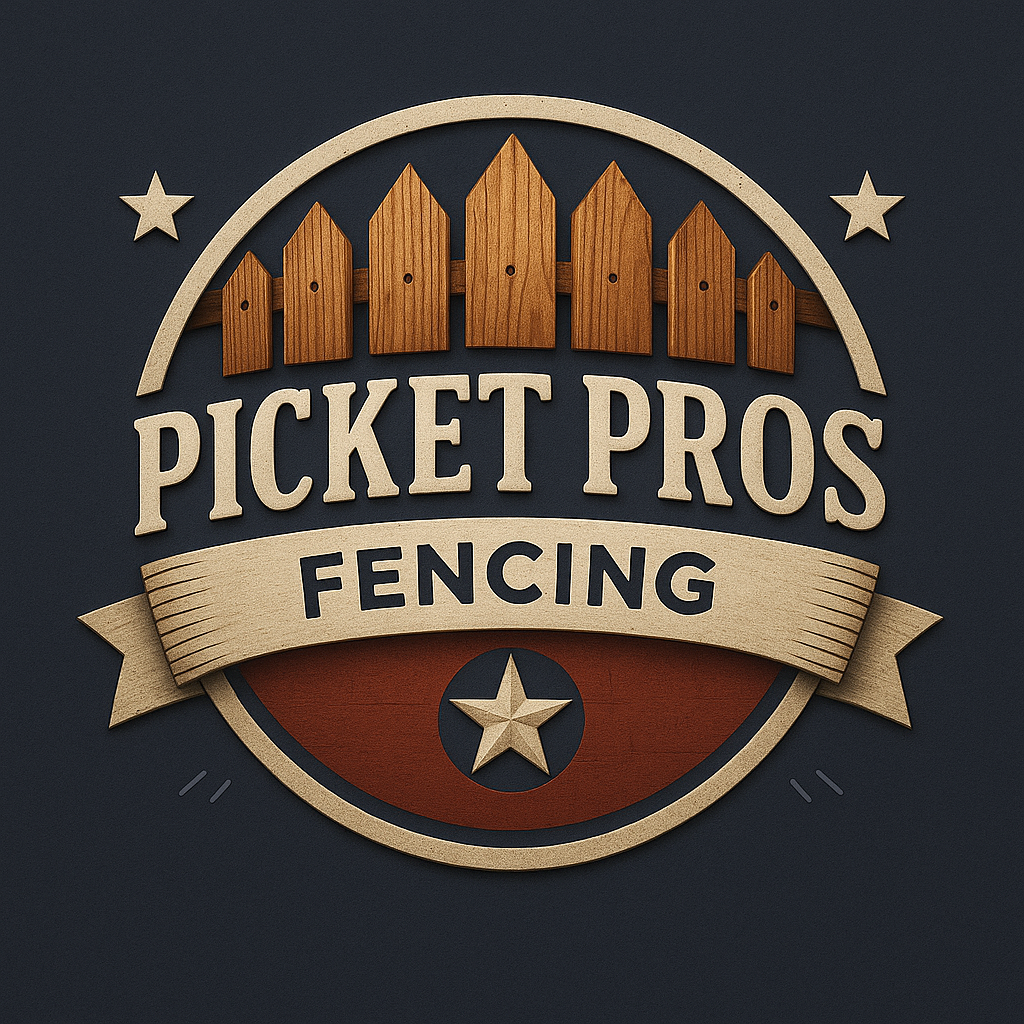Bracketed vs. Routed Vinyl Fencing: Which Lasts Longer?

Looking for a vinyl fence that will truly last? The difference between bracketed and routed vinyl fencing can impact your property’s curb appeal, fence lifespan, and even maintenance costs. At Picket Pros, we specialize in long-lasting vinyl fence installations across the Kansas City metro, and we’re here to help you make the best decision.
In this guide, we’ll break down:
What bracketed and routed vinyl fencing are
How they compare in durability, appearance, and strength
What fence style is best for your climate and soil
How poor installation can cut a 30-year fence life in half
Why choosing the right contractor is just as important as choosing the right material
Understanding Vinyl Fence Construction
Vinyl fencing is known for its low maintenance, clean appearance, and long lifespan. But not all vinyl fences are created equal. The way the rails attach to the posts makes a major difference in both performance and aesthetics.
What is Bracketed Vinyl Fencing?
Bracketed vinyl fencing uses external brackets or clips to attach the rails to the posts. These brackets are usually made of plastic or metal and are fastened with a few screws.
Pros of bracketed vinyl fencing:
Easier and faster to install
Lower upfront cost
Works with retrofitting or mixed-material projects
Cons:
Exposed brackets can crack, rust, or degrade over time
Higher chance of rail sagging or detachment
More visible hardware = less clean aesthetic
Vulnerable to loosening from wind, sun, or shifting soil
What is Routed Vinyl Fencing?
Routed vinyl fencing features precision-cut holes in the posts where the rails slide directly in and lock in place. No brackets or screws are needed—just clean, tight fits.
Pros of routed vinyl fencing:
Cleaner, bracket-free appearance
Stronger and more wind-resistant
Fewer parts that can fail or wear down
Better long-term durability (often 30+ years)
Cons:
Slightly more labor-intensive to install
Usually requires more accurate measurements and professional setup
Marginally higher upfront cost (but lower lifecycle cost)
Lifespan: Which One Lasts Longer?
Vinyl fencing is often marketed as “lifetime” fencing, but that’s only true with the right material and proper installation. Routed vinyl fencing is typically the longer-lasting option.
Here’s why:
Structural Integrity: Routed systems create a fully interlocked design. With no external fasteners to loosen, they better withstand wind, impact, and soil movement.
UV and Moisture Resistance: Brackets can become brittle from UV exposure and may trap water, leading to mold or rust (if metal).
Minimal Weak Points: Brackets are failure points. Routed systems eliminate them entirely.
At Picket Pros, we use routed systems for all of our vinyl fence installations to ensure every fence stands strong for decades.
Aesthetic Appeal: Routed Is Cleaner
If curb appeal is important to you (and it should be), routed vinyl fences look noticeably better.
| Feature | Bracketed Vinyl | Routed Vinyl |
|---|---|---|
| Visible Hardware | ✅ Yes | ❌ No |
| Seamless Design | ❌ No | ✅ Yes |
| Risk of Rust/Crack | ✅ Yes | ❌ No |
| Finish Appearance | Moderate | Premium |
For homeowners in Overland Park, Olathe, and surrounding areas seeking modern, clean fence lines, routed vinyl is the clear winner.
Cost: Don’t Be Fooled by Upfront Price
Bracketed fences may appear cheaper at first, but over 10+ years, routed fences come out ahead:
| Cost Element | Bracketed | Routed |
|---|---|---|
| Upfront Materials | Lower | Higher |
| Installation Labor | Lower | Slightly Higher |
| Maintenance/Repairs | Higher | Lower |
| Lifespan | 10–20 yrs | 30+ yrs |
| Long-Term ROI | Lower | Higher |
Hiring a cheap installer who uses bracketed fencing can lead to early rail sagging, shifting posts, and frequent call-backs. Over time, repairs add up.
How the Right Contractor Makes the Difference
A routed vinyl system still won’t last 30 years if it’s not installed correctly.
At Picket Pros, we’ve repaired dozens of vinyl fences in Lee’s Summit and Shawnee that were poorly installed—brackets misaligned, posts not set deep enough, or rails trimmed short.
Here’s what separates a good install from a bad one:
1. Post Depth and Concrete Setting
We set our vinyl posts a full 30” deep in concrete, even if it’s rocky clay soil. That’s essential for preventing leaning, especially with routed rail connections that require straight alignment.
2. Proper Spacing and Measurement
Routed vinyl must be measured precisely. We dry-fit all panels before setting posts so you don’t end up with awkward gaps or misaligned panels.
3. Premium Vinyl and UV Stabilizers
We only use premium vinyl with UV inhibitors, not recycled or mixed vinyl that becomes brittle in sunlight. It’s more expensive—but it doesn’t crack, fade, or warp.
4. Warranties That Actually Mean Something
Picket Pros offers a competitive workmanship guarantee on all vinyl fencing. Ask your contractor if theirs does.
Routed Vinyl Fence Styles We Offer
Whether you need privacy, style, or semi-open fencing, we offer routed vinyl systems in these styles:
Privacy Vinyl Fence (solid panels for maximum seclusion)
Lattice Top Vinyl Fence (decorative top panels with airflow)
Picket Vinyl Fence (classic, low-profile)
Ranch Rail Vinyl Fence (great for acreage)
Scalloped Vinyl Fence (arched top edges for added style)
View our full vinyl fencing options →
Common Issues With Bracketed Systems (That We’ve Replaced)
Picket Pros has replaced bracketed fences throughout Independence and Blue Springs due to:
Missing or cracked brackets
Posts pulling away from rails
Misaligned panels
Water-damaged fasteners
Unsafe gates with detached hardware
Avoid the cost of redoing it all by choosing a routed fence from the start.
Final Verdict: Routed Vinyl Wins Long-Term
Here’s the bottom line:
Want it to last 30+ years? Go routed.
Want clean, modern curb appeal? Go routed.
Want fewer repairs and a better ROI? Go routed.
If you want to cut corners or flip a house fast, bracketed might “work.” But for most homeowners, a routed system pays off in every way.
Get a Quote for Routed Vinyl Fence Installation
If you’re ready for a premium, long-lasting vinyl fence in the Kansas City area, let’s talk. We serve:
and surrounding cities
📞 Call us at 913-358-5305
🌐 Visit PicketPros.com
📩 Or use our online fence calculator
FAQs
What is the main difference between bracketed and routed vinyl fences?
Bracketed fences use external fasteners to attach rails; routed fences insert rails into post openings for a seamless look and stronger connection.
Which type of vinyl fence is stronger?
Routed vinyl fences are stronger due to their integrated design and lack of external hardware.
Do routed vinyl fences cost more?
Upfront, yes—but they require fewer repairs and last significantly longer, offering better long-term value.
Can bracketed fences last 30 years?
Rarely. Even with good maintenance, bracketed fences tend to fail earlier due to panel degradation and rail separation.
Does Picket Pros only install routed vinyl fences?
Yes. We prioritize longevity and quality in every project, and routed systems consistently outperform bracketed ones.
Ready to upgrade your vinyl fence?
Get a routed system installed by professionals who stand behind their work. Get a free quote today.

